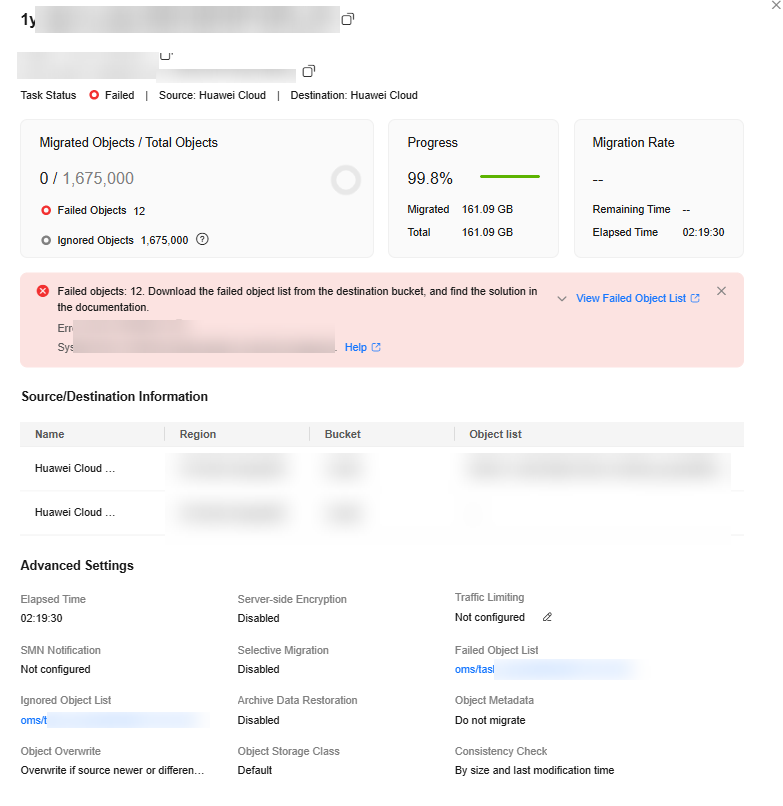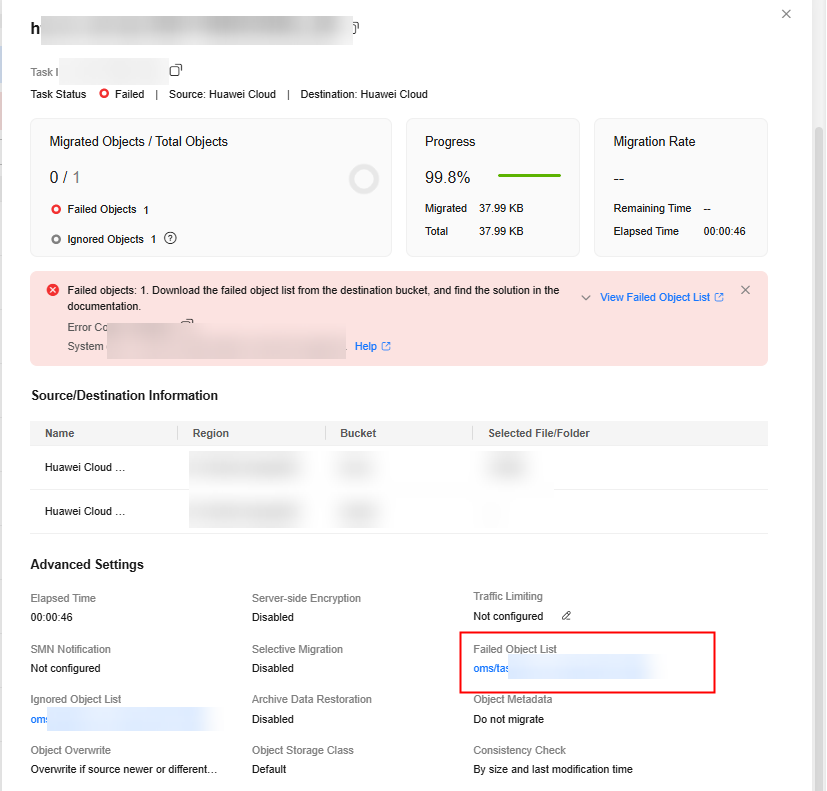What Do I Do If a Migration Task Fails?
The following methods can help you handle the exceptions.
Method 1: Viewing Error Messages on the OMS Console
In the task list, select a failed task and click the task name to view the failure cause in the task details displayed on the right. If a file link is displayed after Failed Object List in the task details, rectify the fault by following the instructions provided in Method 2.

Method 2: Viewing the List of Failed Objects

You can only obtain the list of failed objects if you enabled the Record Failed Objects function when creating a task.
- Check the names of the source objects that fail to be migrated.
In the task list, select a failed task. Click the name of the selected task to view the task details displayed on the right. Click the file link next to Failed Object List to access OBS and download the file.

- View the failure cause of the task.
The failed object list contains information about the failed migration task, including the error codes, occurrence time (local UTC), URL-encoded names of the failed objects, non-URL-encoded names of the failed objects, and error messages returned by source SDKs. For details about how to handle a migration failure, see Table 1.
Figure 1 Failed object list
Table 1 Error codes returned for failed objects Error Code
Description
Solution
GET_SRC_OBJ_META_FAILURE
Failed to obtain the metadata of the source object.
Check whether the source object exists and whether you have the read permission on the object.
For details about how to obtain the required permission, see Permissions Management.
GET_DST_OBJ_META_FAILURE
Failed to obtain the metadata of the destination object.
Check whether you have the read permission on the destination object.
For details about how to obtain the required permission, see Permissions Management.
GET_SRC_OBJ_FAILURE
Failed to obtain the source object.
Check whether the source object exists and whether you have the download permission on the object.
For details about how to obtain the required permission, see Permissions Management.
COMPARE_SRC_AND_CDN_FAILURE
The source objects are inconsistent with the objects mapped to the custom domain name.
Refresh the CDN cache so that the cached object on CDN is the latest.
UPLOAD_DST_OBJ_FAILURE
Failed to upload the object to the destination bucket.
Check whether you have the write permission on the destination bucket.
COMPARE_SRC_AND_DST_KMS_FAILURE
The encryption statuses of source and destination objects are different.
Check whether the encryption status of the destination object is consistent with the setting of KMS encryption of the migration task.
COMPARE_SRC_AND_DST_SIZE_FAILURE
The sizes of the source and destination objects are consistent.
Migrate the object again.
COMPARE_SRC_AND_DST_LAST_MODIFY_DATE_FAILURE
The last modification times of the source and destination objects are inconsistent.
Migrate the object again.
COMPARE_SRC_AND_DST_METADATA_VALUE_FAILURE
The metadata of the source object is inconsistent with that of the destination object.
Migrate the object again.
COMPARE_AND_GET_SRC_OBJ_META_FAILURE
Failed to obtain the metadata of the source object when comparing the source and destination objects after the migration.
Check whether the source object exists and whether you have the read permission on the object.
For details about how to obtain the required permission, see Permissions Management.
COMPARE_AND_GET_DST_OBJ_META_FAILURE
Failed to obtain the metadata of the destination object when comparing the source and destination objects after the migration.
Check whether the destination object exists and whether you have the read permission on the object.
For details about how to obtain the required permission, see Permissions Management.
INIT_DST_OBJ_MULTIPART_FAILURE
Failed to initialize the multipart upload.
Check whether the object supports multipart upload.
NOTE:Objects whose Content-Type is multipart/form-data do not support multipart upload. You need to use obsutil to upload such objects separately.
COMPLETE_DST_OBJ_MULTIPART_FAILURE
Failed to combine the parts in the destination bucket.
- Check whether the source object is modified after the migration task is started.
- Check whether you have the Listing Uploaded Parts permission on the destination bucket. If you do not have this permission, obtain it by referring to
- Migrate the object again.
RESTORE_SRC_ARCHIVE_OBJ_FAILURE
Failed to restore archived data.
Restore the archived data manually and migrate the data. Archive the data after the migration.
NOTE:For details about how to restore archived data, see What Should I Do If My Migration Task Fails Due to an Archived Data Read Failure?
MIGRATE_SRC_ARCHIVE_OBJ_FAILURE
Failed to migrate the data because there is archived data that has not been restored.
Create a migration task again and enable the Archive Data Restoration function. If a large amount of archived data exists, you can manually restore the data and then migrate it.
NOTE:For details about how to restore archived data, see What Should I Do If My Migration Task Fails Due to an Archived Data Read Failure?
URL_LIST_FORMAT_ERROR
The format of the URL list is incorrect.
Check for errors based on the URL list template, rectify the errors, and try again.
For details, see URL List Requirements.
URL_LIST_DOMAIN_FORBIDDEN
The URL list contains forbidden domain names.
Change the domain names and try again. If you have any questions, contact technical support.
URL_LIST_IP_FORBIDDEN
The URL list contains forbidden IP addresses.
Change the IP addresses and try again. If you have any questions, contact technical support.
URL_LIST_OBJECT_KEY_TOO_LONG
URLs in the URL list are too long.
Modify the URLs (a URL can contain a maximum of 65,536 characters) and try again.
URL_LIST_INTERNAL_IP
The host IP addresses in the URL list are internal IP addresses.
Change the IP addresses and try again. If you have any questions, contact technical support.
URL_LIST_INCORRECT_DOMAIN
The domain names in the URL list are incorrect, irresolvable, or do not exist.
Correct the domain names and try again.
SrcObjectModifiedDuringMigration
After the migration task is started, the large source object is modified. As a result, the parts of the large object fail to be merged in the destination bucket.
Migrate the object again.
Feedback
Was this page helpful?
Provide feedbackThank you very much for your feedback. We will continue working to improve the documentation.See the reply and handling status in My Cloud VOC.
For any further questions, feel free to contact us through the chatbot.
Chatbot






